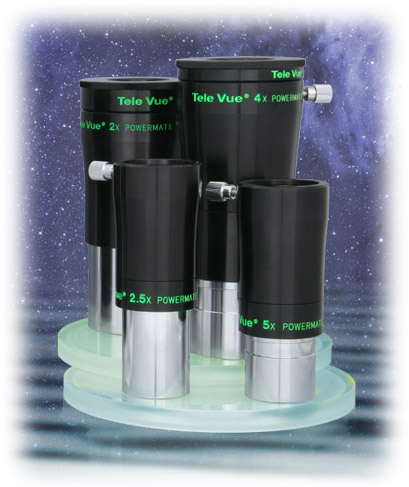Powermates

Tele Vue Powermate and Barlow Image of the Day Winners
Taking award-winning images of distant planetary bodies requires extending your effective focal length to several meters. See Tele Vue's Image of the Day Winners page for examples.
More Powermate Examples
All images produced with the aid of Powermates™.
Click on these exemplary images for full-size display and imaging data.

Imaging in the Stratosphere with Tele Vue Powermate™ amplifiers
Air China A332 crossing the Moon (crop).
©Kacper Lechwar
Air China A332 crossing the Moon (crop).
©Kacper Lechwar
More Powermate™ Images
-
Powermate™ Gallery on flickr
This updated gallery contains the best of the latest Powermate™ images posted to flickr.com - The Allure of the Moon (8/8/2022) — on our blog. Powermate™ allows for close-up views of lunar features.
- Solar Update: July 2022 (7/20/2022) — on our blog. Powermate™ allows for close-up views of prominences, spots, fibrils, etc.
- Solar Update: March 2022 (3/22/2022) — on our blog. Powermate™ for great solar imaging.
- Mars: Keep on Viewing & Imaging! (10/30/2020) — on our blog. Powermate™ images the planet Mars.
- Powermate Solar Imaging from Kent, UK! (6/25/2020) — on our blog. Our Powermate™ teams up with a Lunt Solar Telescope.
- Mars Opposition Season Images! (9/11/2020) — on our blog. Our Powermate™ amplifiers and Barlows are tasked with capturing the best Mars image every Opposition.
- Your 2019 Mercury Transit Images! (11/22/2019) — on our blog. Powermate™ for transit imaging.
- The Sun from Sunny Barcelona, Spain (3/6/2019) — on our blog. This Powermate™ lives on a balcony.
- Imaging in the Stratosphere with Tele Vue! (10/5/2018) — on our blog. Powermate™ takes plane spotting into the stratosphere!
- Szabolcs Nagy: Powermate™ User Profile (2/28/2018) — on our blog. Powermate™ reaches out and "touches" the International Space Station!
- Roger Hutchinson: Powermate™ User Profile (12/6/2017) — on our blog. "I use the 2.5x Powermate™ for my high resolution imaging as nothing else comes close to delivering the bright crisp images provided by this great piece of kit", says Roger.
- August 21, 2017 Solar Eclipse: Inside the SOLAR LAB (8/9/2017) — on our blog. Powermate™ shows people the Sun as through a 6.4-meter scope!











